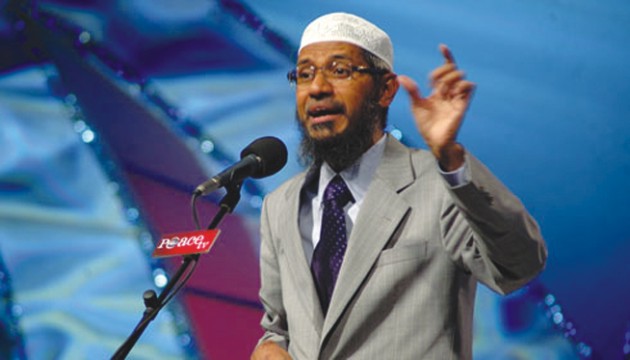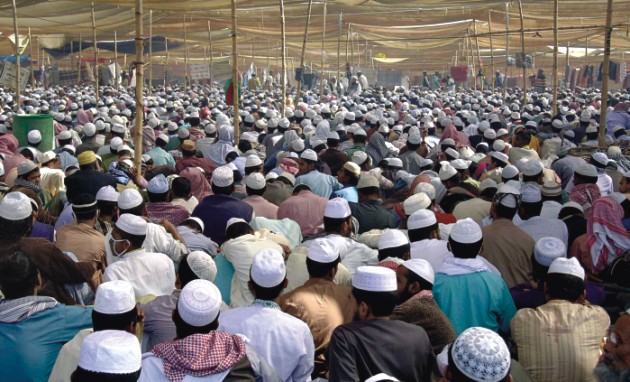
Inside
|
The Trouble with Naik
FARAH MEHREEN AHMED and JYOTI RAHMAN read between the lines of the messages of Zakir Naik.

Zakir Naik is a doctor by training. But that's not what he is known for. It's actually hard to describe him. His acolytes would call him a scholar of Islam -- an aleem. But the traditional ulema, from both his native India as well as from elsewhere, don't consider his scholarly bona fides. And in the way he uses the television and the English language, he isn't like any traditional aleem either. One might say he is the closest thing in the subcontinent resembling an American televangelist. He says his mission is to reconvert the Muslim youth to the path of faith -- not dissimilar to the American preachers seeking to create born again Christians.
Dr. Naik visited Dhaka in early December, giving a series of lectures. The reader would recall, that was a time when the hartal politics seemed to have made a return. It was also a time when the Indian film star Shah Rukh Khan's Dhaka concert captured the attention of Dhakaites. Naik's visit was overshadowed by these events. And yet, Naik's visit may be portent of things to come in a more significant way than most other recent developments.
While the mainstream media has been rather silent about the implications of Dr. Naik's visit, it has received some attention in the blogosphere. Consider the post 'Zakir Naik er Bangladesh safar, rajju tey sharpavram?' by Hasan Morshed in Bangla blog Sachalayatan1.
Morshed's thesis is that Naik's visit is problematic because it could hurt the war crimes trial. But Naik has as much to do with the war criminals of 1971 as Saddam Hussein had to do with Osama Bin Laden. The connections are laughable, except for their dangerous implications. In the case of war crimes trial, when progressive bloggers link Naik to the trial, they only support the war criminals' claims that the entire trial process is an attempt to denigrate Islam. Progressives conflate the trial with other issues at their own peril. Nothing good can come of these kinds of intellectual mistakes.
In the English blog Unheard Voice, Khujeci_tomai takes a different approach.2 Her thesis is that there is an arc connecting Naik's preaching with the fire and brimstone of the proponents of violent jihad. Theoretically, the connection is undeniable.
But in practice, how seriously should we take this? After all, the kind of stuff Naik says is also heard in thousands of mosques around the country on any given Friday. And the annual gathering in Tungi draws a far, far bigger crowd than anything Naik will get. If we were to take Khujeci_tomai's fear seriously, would we not be wary of Tabligh Jamaat and the local mosques? Needless to say, if one were to worry thus, one would have a hard time in a 90% Muslim country.
So, what does Naik preach typically? Here is a direct quote:
Suppose my sister happens to be one of the unmarried women living in USA, or suppose your sister happens to be one of the unmarried women in USA. The only two options remaining for her are that she either marries a man who already has a wife or becomes public property.
Videos of his 'lectures' and 'debates' are widely available online.3 And there is of course the Peace TV, which can be viewed in most households in Dhaka.
Dr. Naik's oratorical style follows a pattern. Let's stick to his views on women for illustrative purposes.

STAR PHOTO
First, the opponent's words are twisted to perplex him (very rarely, if ever, her). This is followed by a few hard-hitting, unblinking punch-lines that convince the general audience (which usually applauds at this point). This is followed by the sentimental melodrama that reminds one of the classic Dhallywood dialogue -- toder ki maa bon nei? By this time, the all-male audience has had a major morale boost because they feel like saviours, protectors and heroes -- women are sexual beings so if men don't marry them, they will go astray.
Then Naik takes it up a gear. Apparently, Americans are converting to Islam in droves -- clearly this is great and any questioning of misogynistic interpretation of Islam is redundant. Of course, while talks about Islam degrading women, it's the American 'art and culture' that degrades women and sells them -- apparently only BMW and beauty pageants constitute art and culture. Of course, Islam won't allow it (does that mean Islam is opposed to art and culture?) -- more applause.
The big take away: women can't do anything for themselves, if men don't take care of them, they are doomed.
The arguments are like this: all cats have whiskers, your grandfather has whiskers, your grandfather is a cat. Needless to say, this fails Logic 101. And yet, Naik has his audience enthralled.
His facades make him terrifying. He claims to quote from various religious texts -- a tolerant fellow, not a typical mullah. Fans gush over his memory and knowledge based on the fact that he is able to throw page numbers and verses at them effortlessly from memory. He holds up the books when he refers to them. Of course, no one really bothers to cross-check what he is saying?
A doctor by training, when he says 'evolution is just a theory which became popular because it was against the Bible', the crowd swallows hard. And he appeals to men's base instinct, in English: if men don't marry, women are doomed into prostitution -- you are only here to save my brother!
He appeals to the 'educated Muslim'. He is in a class (pun intended) of his own, so very unlike the typical mullah. He is the very model of a modern Muslim man!
But think about Naik's message. He talks about women's empowerment, but does not once mention self-sufficiency. He talks about women as if they are something to have ownership over. He says that men should assume the role of caregivers, automatically suggesting that women are inferior. He says it as if it is not only normal, but right. Not only does he assume and accept a patriarchal social system, but justifies it. He asserts, leaves out nuances and leaves no room for the listener to reflect and/or scrutinise.
And this message Naik peddles to the influential.
Language is a class statement and since his teachings are in English, we can safely assume that his followers would have had a certain level of education. When groups that are relatively less socio-economically vulnerable fall prey to ideology-induced vulnerability, it's extra alarming since these are the people who have more space to manoeuvre free thought. In societies such as ours, tapping the classes is far more dangerous than tapping the masses. You control the top, you control them all.
Our political economy reality is that an ordinary farmer who believes in the local pir's magic waters over medicine is at most a threat to his self and family. But if a businessperson/professional/politician chooses an Imam over a professor, it threatens the broader society because this person has more agency to execute his or her belief.
And this is also why, like Khujeci_tomai, we need to worry more about Naik than so many home-grown fanatics and fundamentalists who preach the same stuff. We don't yet have a home-grown fundo who has the shikkhito facade. The most (in)famous Naik-like person in Bangladesh is Delwar Husseyn Sayeedi. And he has the accusation of being a war criminal hanging over him.
Naik, as we noted right at the beginning, is free of any 1971 baggage.
But why does the educated class of Bangladesh find what is supposed to be the opiate of the masses so appealing?
We seldom think about it, but if we thought for a moment, it would be self-evident how rapidly the Bangladeshi society is changing. Nowhere is this felt more acutely than among the urban educated folks, people who once used to call themselves shikkhito moddhobitto bhadralok. In any random conversation in any random social event, one can notice a nostalgia, a sense that something valuable is being lost even as people's lives have improved materially. One doesn't have to believe in Marx's theory of alienation to recognise that capitalist-materialist social changes inevitably cause massive social disruptions.
Faced with the disconcerting pace of change, many find refuge in Naik. When worrying about how to raise children in the digital world, seeing the changing gender dynamics at home and abroad, facing difficult decisions about parent's health, Naik's simplistic messages resonate to. And some will go one step further and seek politics based on religion. Not necessarily violent politics. Perhaps perfectly legitimate, democratic, peaceful politics. But Islamist politics all the same.
And when the war criminals will be dead, when 1971 will not be in the living memory of 90% of the country, we will still have to contend with that politics. Yelling tui razakar will not help then.
In fact, it won't help with Naik today. And that, dear reader, is the biggest trouble with Naik.
1. http://www.sachalayatan.com/hasan _murshed/35478.
2. http://unheardvoice.net/blog/2010/11/ 02/zakir-naik-2/.
3. An example is available here: http:// unheardvoice.net/blog/2010/11/05/for-fans-of-horror/.
Farah Mehreen Ahmad is a postgraduate student and Jyoti Rahman is a blogger. They are both members of Drishtipat Writers' Collective (www.drishtipat. org/dpwriters) and can be reached at dpwriters@ drishtipat.org.